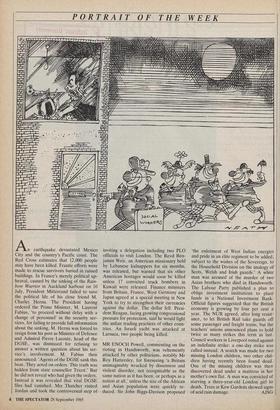PORTRAIT OF THE WEEK
An earthquake devastated Mexico City and the country's Pacific coast. The Red Cross estimates that 12,000 people may have been killed. Frantic efforts were made to rescue survivors buried in ruined buildings. In France's merely political up- heaval, caused by the sinking of the Rain- bow Warrior in Auckland harbour on 10 July, President Mitterrand failed to save the political life of his close friend M. Charles Hernu. The President having ordered the Prime Minister, M. Laurent Fabius, 'to proceed without delay with a change of personnel' in the security ser- vices, for failing to provide full information about the sinking, M. Hernu was forced to resign from his post as Minister of Defence and Admiral Pierre Lacoste, head of the DGSE, was dismissed for refusing to answer a written question about his ser- vice's involvement. M. Fabius then announced: 'Agents of the DGSE sank this boat. They acted on orders. This truth was hidden from state counsellor Tricot.' But he did not reveal who had given the orders. Instead it was revealed that vital DGSE files had vanished. Mrs Thatcher visited Jordan and took the controversial step of
inviting a delegation including two PLO officials to visit London. The Revd Ben- jamin Weir, an American missionary held by Lebanese kidnappers for six months, was released, but warned that six other American hostages would soon be killed unless 17 convicted truck bombers in Kuwait were released. Finance ministers from Britain, France, West Germany and Japan agreed at a special meeting in New York to try to strengthen their currencies against the dollar. The dollar fell. Presi- dent Reagan, facing growing congressional pressure for protection, said he would fight the unfair trading practices of other coun- tries. An Israeli yacht was attacked at Larnaca, two people being killed.
MR ENOCH Powell, commenting on the rioting in Handsworth, was vehemently attacked by other politicians, notably Mr Roy Hattersley, for foreseeing 'a Britain unimaginably wracked by dissension and violent disorder, not recognisable as the same nation as it has been, or perhaps as a nation at all,' unless the size of the African and Asian population were quickly re- duced. Sir John Biggs-Davison proposed `the enlistment of West Indian energies and pride in an elite regiment to be added, subject to the wishes of the Sovereign, to the Household Division on the analogy of Scots, Welsh and Irish guards.' A white man was accused of the murder of two Asian brothers who died in Handsworth. The Labour Party published a plan to oblige investment institutions to place funds in a National Investment Bank. Official figures suggested that the British economy is growing by four per cent a year. The NUR agreed, after long resist- ance, to let British Rail take guards off some passenger and freight trains, but the teachers' unions announced plans to hold twice as many strikes this term as last. Council workers in Liverpool voted against an indefinite strike: a one-day strike was called instead. A search was made for two missing London children, two other chil- dren having recently been found dead. One of the missing children was then discovered dead under a mattress in her mother's own flat. A man was convicted of starving a three-year-old London girl to death. Trees at Kew Gardens showed signs














































 Previous page
Previous page